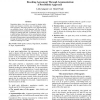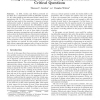4978 search results - page 29 / 996 » Logical models of argument |
ENTCS
2002
13 years 8 months ago
2002
In this paper, we develop the notion of fuzzy unification and incorporate it into a novel fuzzy argumentation framework for extended logic programming. We make the following contri...
IBERAMIA
2010
Springer
13 years 6 months ago
2010
Springer
In a recent paper [2] the authors have formalized a recursive semantics for warranted conclusions in a general defeasible argumentation framework based on a propositional logic. Th...
KR
2004
Springer
14 years 2 months ago
2004
Springer
Negotiation plays a key role as a means for sharing information and resources with the aim of looking for a common agreement. This paper proposes a new approach based on possibili...
HASKELL
2006
ACM
14 years 2 months ago
2006
ACM
Haskell’s type system with multi-parameter constructor classes and functional dependencies allows static (compile-time) computations to be expressed by logic programming on the ...
COMMA
2006
13 years 10 months ago
2006
Abstract. In 2005, Gordon and Walton presented initial ideas for a computational model of defeasible argument [12, 26], which builds on and elaborates Walton's theory of argum...


